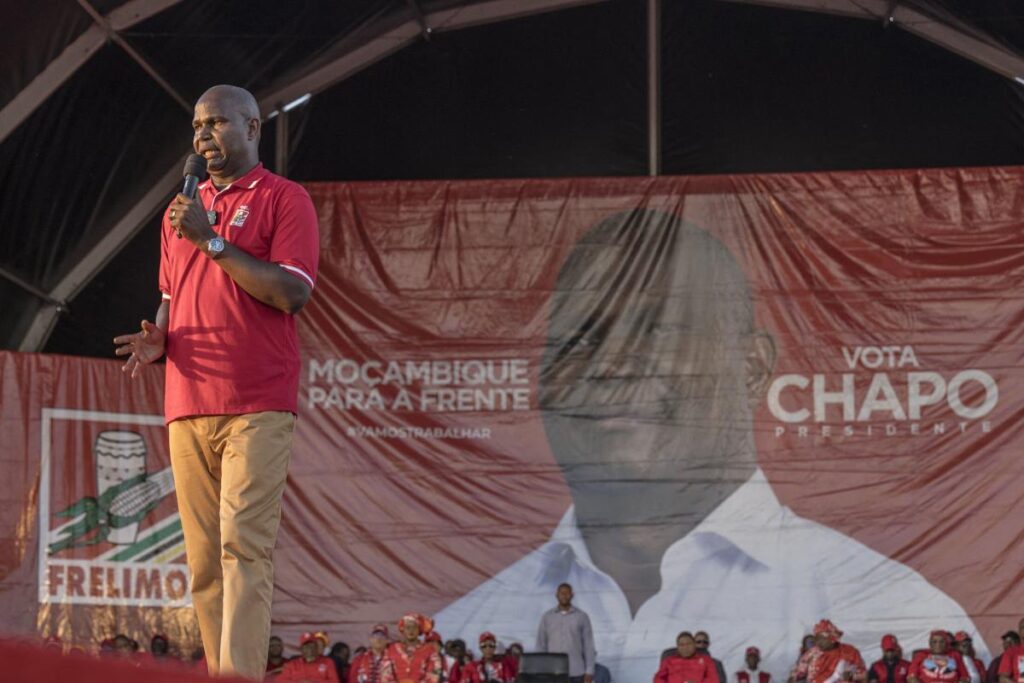(Bloomberg) — Mozambique’s ruling party took an early lead as votes were counted in an election widely expected to extend its 49-year rule, with a new independent challenger coming in second after winning a wave of discontent among the youth in the gas-rich nation.
Most read from Bloomberg
Daniel Chapo, a former provincial governor and candidate for the ruling Mozambique Liberation Front, received 70% support in 30 of a total of 154 districts, according to provisional results from the Oct. 9 vote shared by the electoral commission. He needs more than 50% to win without going to a runoff.
Venancio Mondlane, a former opposition lawmaker and banker backed by the small Podemos party, has so far had about 23% of the vote. He left behind Ossufo Momade, chairman of the main opposition Mozambican National Resistance party, or Renamo.
While the early vote count does not necessarily reflect the final outcome, it signals likely policy continuity in the southeast African country of about 35 million.
Mondlane’s strong showing could allow him to mobilize a large base of support to protest the results, which he already claims are tainted by irregularities. Observers have also noted problems, including possible ballot box stuffing.
Early district figures included some areas in Gaza province seen as ruling party strongholds. In Chigubo, for example, Chapo won almost 99% of the vote, with a turnout of 96%. A similar picture emerged in other rural areas such as Massingir, which borders the neighboring Kruger National Park in South Africa.
Electoral authorities have until Monday to announce the provincial figures, and until October 24 to announce the final national results. So far, they have announced that Chapo won with 53.7% of the vote in the city of Maputo, and 65.8% in the northeastern province of Cabo Delgado.
Although Mondlane has described several incidents, he has yet to provide evidence.
The former lawmaker claimed last week that his team’s parallel count showed him on track for a landslide victory, based on early numbers. He had earlier called on young supporters to take to the streets to declare victory and defend what he said was the will of the people.
Mozambique is one of the poorest countries in the world; according to the World Bank, nearly three in four citizens lived on less than $2.15 a day last year.
Young people face special challenges. The average teacher-student ratio in primary schools is 64. And according to the Ministry of Finance, one in three young people is not in work, education or training.
The population is poorer than a decade ago, despite massive natural gas discoveries, and many voters have become disillusioned. An Afrobarometer survey published in July found that support for democracy has fallen to less than 50%, making Mozambique one of four African countries where a minority now favors the system.
Mondlane made a name for himself in Mozambique’s 2023 municipal elections, when he unsuccessfully ran for Renamo for mayor of Maputo, the capital. He claimed he only lost because of fraud, and led major protests against the results.
He tried to challenge Momade as leader of the opposition in May, but the party blocked him. Mondlane subsequently left the party which won less than 22% in the 2019 elections, with Momade at the helm.
At his campaign events, Mondlane attracted large crowds of young people in a country where the average age is about 17.
Whoever is declared the winner will take over in January from President Filipe Nyusi, who will relinquish power after the expiry of the legal term of two five-year terms.
(Updates with details on election turnout in 6th paragraph)
Most read from Bloomberg Businessweek
©2024 BloombergLP







